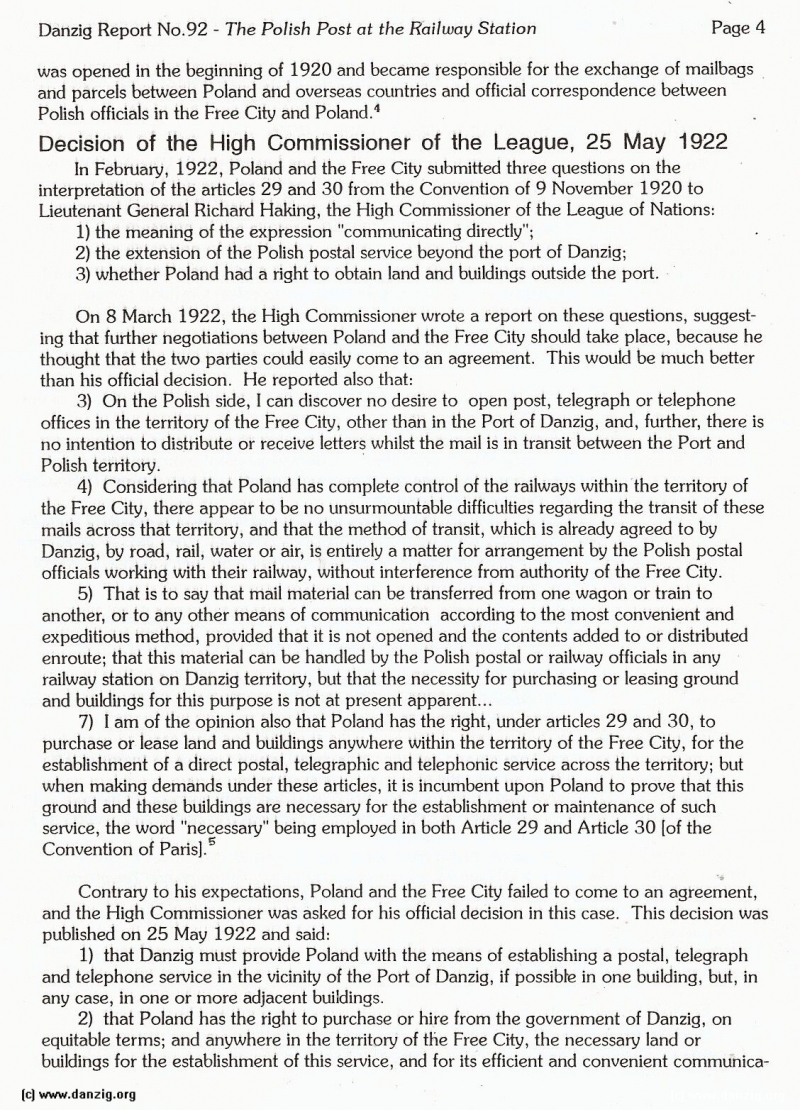
> The Polish Post office at the Railway Station in Danzig
was opened In the beginning of 1920 and became responsible for the exchange of mailbags and parcels between Poland and overseas countries and official correspondence between Polish officials in the Free City and Poland. 4
Decision of the High Commissioner of the League, 25 May 1922
In February, 1922, Poland and the Free City submitted three questions on the interpretation of the articles 29 and 30 from the Convention of 9 November 1920 to Lieutenant General Richard Haking, the High Commissioner of the League of Nations:
1) the meaning of the expression “communicating directly”;
2) the extension of the Polish postal service beyond the port of Danzig;
3) whether Poland had a right to obtain land and buildings outside the port.
On 8 March 1922, the High Commissioner wrote a report on these questions, suggesti ng that further negotiations between Poland and the Free City should take place, because he thought that the two parties could easily come to an agreement. This would be much better than his official decision. He reported also that:
3) On the Polish side, I can discover no desire to open post, telegraph or telephone offices in the territory of the Free City, other than in the Port of Danzig, and, further, there is no intention to distribute or receive letters whilst the mail is in transit between the Port and Polish territory.
4) Considering that Poland has complete control of the railways within the territory of the Free City, there appear to be no unsurmountable difficulties regarding the transit of these mails across that territory, and that the method of transit, which is already agreed to by Danzig, by road, rail, water or air, is entirely a matter for arrangement by the Polish postal officials working with their railway, without interference from authority of the Free City.
5) That is to say that mail material can be transferred from one wagon or train to another, or to any other means of communication according to the most convenient and expeditious method, provided that it is not opened and the contents added to or distributed enroute; that this material can be handled by the Polish postal or railway officials in any railway station on Danzig territory, but that the necessity for purchasing or leasing ground and buildings for this purpose is not at present apparent...
7) 1 am of the opinion also that Poland has the right, under articles 29 and 30, to purchase or lease land and buildings anywhere within the territory of the Free City, for the establishment of a direct postal, telegraphic and telephonic service across the territory; but when making demands under these articles, it is incumbent upon Poland to prove that this ground and these buildings are necessary for the establishment or maintenance of such service, the word “necessary” being employed in both Article 29 and Article 30 [of the Convention of Paris]. 5
Contrary to his expectations, Poland and the Free City failed to come to an agreement, and the High Commissioner was asked for his official decision in this case. This decision was published on 25 May 1922 and said:
1) that Danzig must provide Poland with the means of establishing a postal, telegraph and telephone service in the vicinity of the Port of Danzig, if possible in one building, but, in any case, in one or more adjacent buildings.
2) that Poland has the right to purchase or hire from the government of Danzig, on equitable terms; and anywhere in the territory of the Free City, the necessary land or buildings for the establishment of this service, and for its efficient and convenient communica-
Danzig Report Nr. 92 - July - August - September - 1996, Page 4.
Hits: 3713
Added: 14/07/2015
Copyright: 2025 Danzig.org

